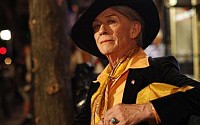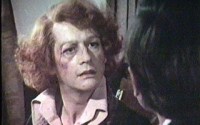
scr Brian Fillis
with John Hurt, Denis O'Hare, Jonathan Tucker, Cynthia Nixon, Swoosie Kurtz, Richard Joseph Paul, Monika Baskiewicz, Gregg Payne, Kathryn Gerhardt, Andrew Halliday, Peter Simon Hilton, Peter Reardon
release UK 4.Jan.10 dvd
09/UK 1h14

Unapologetic: Hurt





 It's been 34 years since John Hurt played Quentin Crisp in THE NAKED CIVIL SERVANT, and he returns to the role to re-enact the final years of this remarkable, controversial man. It's a bit simplistic as a film, but Hurt is astonishing.
It's been 34 years since John Hurt played Quentin Crisp in THE NAKED CIVIL SERVANT, and he returns to the role to re-enact the final years of this remarkable, controversial man. It's a bit simplistic as a film, but Hurt is astonishing.
The story picks up in the late 1970s, as Crisp (Hurt) moves to New York and finds a home among the outcasts there. But when he starts going more mainstream in his writings and public appearances, the gay community turns on him. And he gets in big trouble for trying to defuse the hysteria around Aids when it's still something new and terrifying. His agent (Kurtz) has no idea what to do with him, nor does his publisher (O'Hare). More his style are a lively performance artist (Nixon) and a bright young painter (Tucker).
Hurt inhabits Crisp entirely, commanding every scene with sheer charisma and clearly relishing the colourful costumes and larger-than-life persona. The dialog is endlessly quotable, perhaps a bit too much so. Although the production values are like a fairly basic TV movie, without any real insight in the direction or editing, and a contrived structure that tries to smooth out Crisp's life into a manageable story arc. Many scenes feel only half-written: raising ideas, letting Crisp reel off another memorable line, then cutting away.
But along the way, the script digs into some strong issues. Crisp is intriguingly critical of the gay community, noting how its clone-like leanings are creating another kind of ghetto. And his commentary about general society is even more lacerating. But what really sticks in the mind are the observations on contentment and self-image, beautifully delivered by Hurt in a way that let us understand why Crisp was so unafraid to be who he was.
These are the things that linger in the mind long after the film ends. What would you be like if there was nobody else on earth? What would you believe if nobody else had an opinion? The only way to be happy is to be that person. And you can never be truly happy if you're dependant on another person's love.
 |
themes, language | 11.Feb.09 bff |

 Still waiting for your comments ... don't be shy.
Still waiting for your comments ... don't be shy.
 The Autobiography of Quentin Crisp
The Autobiography of Quentin Crisp
scr Philip Mackie
with John Hurt, Liz Gebhardt, Patricia Hodge, Colin Higgins, John Rhys-Davies, Roger Lloyd Pack, Adrian Shergold, Stanley Lebor, Katharine Schofield, Lloyd Lamble, Joan Ryan, Quentin Crisp
release UK 17.Dec.75
75/UK Thames 1h17

Beaten and bruised: Hurt


 It's fascinating to revisit this 1975 TV movie, watching the young John Hurt completely disappear into his performance as the flamboyant Quentin Crisp (who appears to introduce the film). The filmmaking is rather simplistic, but Hurt's performance and the issues the film raises are deep and provocative.
It's fascinating to revisit this 1975 TV movie, watching the young John Hurt completely disappear into his performance as the flamboyant Quentin Crisp (who appears to introduce the film). The filmmaking is rather simplistic, but Hurt's performance and the issues the film raises are deep and provocative.
Born in 1908, Quentin Crisp (Hurt) grew up being himself, and unapologetically so. As an effeminate man wearing makeup, luridly dyed hair and flowing clothing, he was courting danger wherever he went. Especially since homosexual activity was still a criminal offence in Britain at the time. But he discovers kindred souls in London's cafes and streets and never bows to the taunting of homophobes, who sometimes turned very violent. He has long relationships with a few men (Higgins, Rhys-Davies, Lebor), but comes to realise that his dream "big dark man" will never materialise.
What makes this story worth seeing--and still timeless and important--is Crisp's refusal to play any game when it came to who he was. He simply put himself out there and said, "This is me, love it or hate it," and then took what came to him as a result. But along the way he made some extremely loyal friends and discovered the joys of exhibitionism (the title refers to his work as a model in art classes). The film also traces several striking events in his life, most notably his brazen approach to the military at the start of the war and then an amazing court case when he was charged with public indecency but essentially proved that he police had entrapped him and lied, all while still openly proclaiming his sexuality.
Crisp's quotable aphorisms fill the dialog, and Hurt has a great time delivering each witty, cheeky line. The result is often hilarious, and also surprisingly emotional. And Hurt gets so deep into the role that it takes the breath away. His performance, combined with the bold approach to issues of prejudice and violence, still feel fresh now, even if the movie has a cheesy 1970s TV tone. But it's Crisp's raw honesty that shines through; even all these years later, Hurt's performance and Crisp's observations are far ahead of their time.
 |
themes, violence, innuendo | 26.Mar.09 |
HOME | REVIEWS | NEWS | FESTIVAL | AWARDS | Q&A | ABOUT | TALKBACK